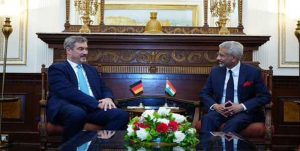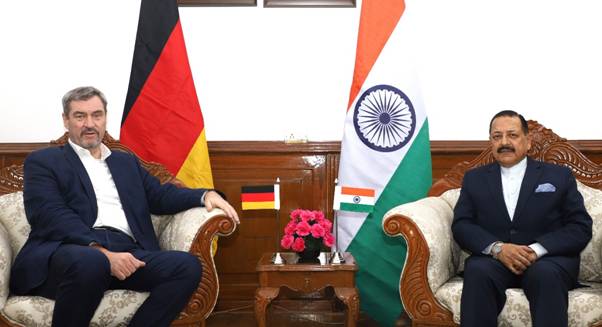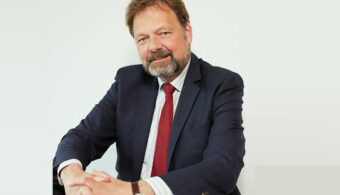In a significant step toward deepening strategic cooperation, India and Germany reaffirmed their commitment to expanding collaboration in science, technology, and innovation. The pledge came during a high-level meeting in New Delhi on Sunday, 13 April, between India’s Union Minister of Science and Technology Dr. Jitendra Singh and Markus Söder, Minister-President of the German state of Bavaria. The discussions spanned next-gen technologies, talent mobility, and cross-cultural academic exchanges, underscoring the growing Indo-German partnership in high-impact sectors.
High-Level Talks Focus on Emerging Technologies
The meeting began with a one-on-one interaction between Minister Singh and Minister-President Söder, followed by a broader delegation-level dialogue. Both sides identified priority areas for intensified cooperation—artificial intelligence, quantum technologies, biotechnology, clean energy, green hydrogen, electric mobility, and cyber-physical systems.
Dr. Singh called Germany a “natural partner” in India’s quest for sustainable, tech-driven growth. He lauded the shared vision of innovation-driven progress and praised the Indo-German 2+2 model of collaboration—which brings academia and industry together across both nations—as a forward-looking framework for global problem-solving.
“This collaboration is more than symbolic—it’s a future-ready model enabling co-development and commercialization,” Singh said, adding that the recent Indo-German governing body meeting in Germany highlighted the momentum of this growing alliance.
India’s Biotech Boom and New BIOe3 Policy Take Centre Stage
A key highlight of the meeting was India’s rapid advancement in the biotechnology sector. Singh spotlighted India’s position as a global leader in vaccine production and cited the rise of more than 3,000 biotech startups. He also emphasized the newly introduced BIOe3 policy, which focuses on Energy, Economy, and Employment to catalyze innovation and industrial growth in the biotech space.
“The BIOe3 framework is our strategy to accelerate the biotech revolution and unlock new economic pathways,” Singh stated.
Expanding Cooperation in Space, Nuclear, and Startups
India’s growing openness to private participation in its space technology and nuclear energy sectors was highlighted as another potential area for Indo-German cooperation. Minister Singh noted that India now ranks third globally in the number of startups and unicorns, making it a hotbed for global investment and tech partnerships.
Academic Exchanges: Strengthening the People-to-People Connect
Minister Singh emphasized the need for robust educational ties, sharing that more than 50,000 Indian students—mostly in STEM disciplines—are currently pursuing higher education in Germany. This figure has tripled in just seven years.
He also encouraged a reciprocal influx of German students to India, particularly in fields such as Oriental Studies, traditional knowledge systems, and Indian culture.
“Germany has become a top destination for Indian youth. We now hope to welcome more German scholars exploring India’s rich intellectual traditions,” Singh said.
Bavaria’s Vision: Talent Pipelines, Free Trade, and Tech Synergy
During his India visit, Markus Söder stressed Bavaria’s commitment to strengthening ties with India not only for regional collaboration but for broader EU engagement. He expressed keen interest in pushing forward a comprehensive free trade agreement between India and the European Union.
“In a time of unstable global trade, India represents a vital and stable partner. We must foster long-term economic ties and open new markets,” Söder shared on social media.
He announced plans to establish a “fast lane” for skilled Indian professionals, along with a student scholarship program to enable educational exchanges between Bavaria and India. Söder called India a key partner for Bavaria’s ambitions as Germany’s “Space Valley,” pointing to the synergy between Bangalore and Munich as innovation hubs.
Cultural Diplomacy: Söder Visits Rajghat and Sikh Gurdwara
Adding a cultural dimension to the visit, Söder paid tribute to Mahatma Gandhi at Rajghat, calling it “a deeply moving place of remembrance.” He also visited the Bangla Sahib Gurdwara, where he observed the Sikh tradition of community kitchens serving thousands daily.
“There is wealth in India, but also poverty. The Sikh principle of sharing reflects the heart of Indian hospitality,” he said, posting photos in traditional Indian attire.
Strengthening Strategic and Cultural Partnerships

External Affairs Minister S. Jaishankar also met with Söder, where they discussed the role of Bavaria in enhancing Indo-German ties, particularly in the realms of technology, talent, transatlantic cooperation, and Indo-Pacific affairs.
Jaishankar noted Bavaria’s pivotal role in shaping Germany’s contribution to EU-India relations and emphasized mutual interests in innovation and academic exchange.
A Shared Future Rooted in Innovation and Trust
With over five decades of scientific cooperation, India and Germany continue to build a forward-looking, resilient partnership. Sunday’s meeting reaffirmed their mutual commitment to leveraging technology for economic growth, global sustainability, and cross-cultural learning.
“Our cooperation is rooted in trust, technology, and a shared commitment to shaping the future together,” Singh concluded.


